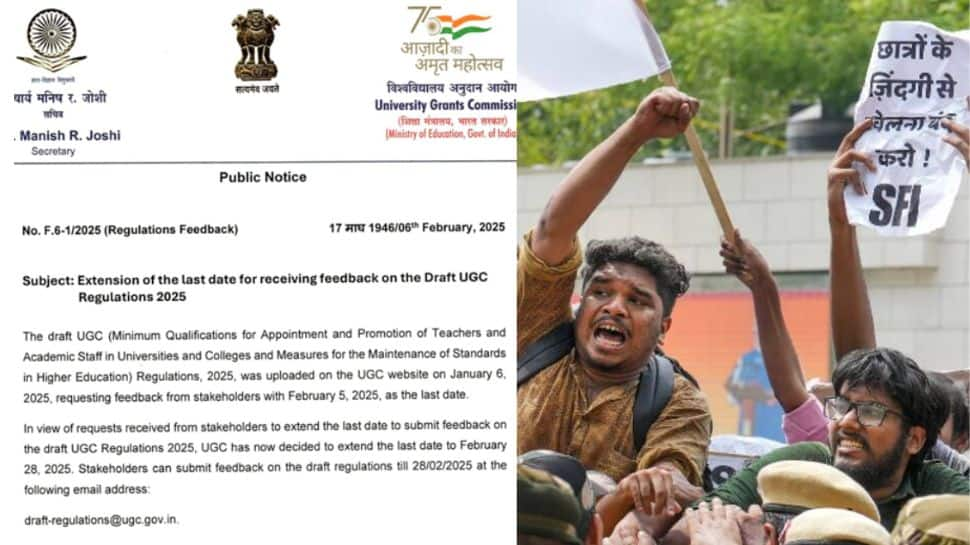 |
|
The University Grants Commission (UGC) has found itself at the center of a significant controversy surrounding its draft regulations for 2025. The proposed changes, which aim to streamline faculty hiring and selection processes in higher education institutions across India, have ignited widespread protests and strong opposition from various political parties and state governments. The heart of the contention lies in the relaxed eligibility criteria for faculty positions. The draft regulations allow candidates to qualify for faculty roles based on passing the UGC-NET in any subject, irrespective of their undergraduate and postgraduate specializations. This departure from previous norms, which emphasized alignment between a candidate's academic background and the subject they teach, has raised concerns about the potential dilution of academic standards and expertise. The UGC, however, maintains that these changes are intended to enhance transparency and remove ambiguities in the selection process.
The revised guidelines for selecting vice-chancellors further contribute to the controversy. The inclusion of professionals from diverse fields like public policy, public administration, and industry alongside academics and researchers expands the pool of potential candidates. While proponents argue this broadens the leadership perspective in higher education institutions, critics express concerns about the potential lack of sufficient academic experience and understanding of the intricacies of university administration among non-academic candidates. The process itself, involving the chancellor forming the search-cum-selection committee, a detail not explicitly mentioned in the 2018 regulations, also faces criticism for potentially introducing bias or undue influence. The UGC Chairman, M. Jagadesh Kumar, has defended the changes, asserting that they aim to enhance transparency and simplify the selection process. However, the lack of detailed explanation on how potential conflicts of interest will be managed in the new selection committee has fuelled opposition sentiment.
The opposition to the draft regulations is not confined to academic circles. Significant political opposition has emerged, with protests organized by prominent political figures from various parties. Congress leader Rahul Gandhi, Samajwadi Party chief Akhilesh Yadav, and several DMK MPs actively participated in demonstrations against the proposed changes. The protests highlight the deep-seated concerns regarding the potential impact of these regulations on the future of higher education in India. The political dimension adds a layer of complexity to the debate, casting doubt on the neutrality of the UGC's decision-making process. Six states – Himachal Pradesh, Jharkhand, Kerala, Tamil Nadu, Telangana, and Karnataka – have jointly passed a resolution urging the withdrawal of the draft regulations. This concerted opposition reflects the widespread unease surrounding the proposed changes across various states, emphasizing the national implications of the policy.
Rahul Gandhi's criticism of the proposed changes goes beyond the technical aspects of faculty selection and vice-chancellor appointments. He linked the UGC regulations to the alleged attempts by the RSS (Rashtriya Swayamsevak Sangh) to impose a uniform idea of Indian history, culture, and tradition across the nation. This connection further politicizes the debate and emphasizes the perceived ideological motivations behind the changes, thereby amplifying the opposition. The broader political context fuels suspicion and mistrust among the opposition parties, intensifying the criticism and deepening the ongoing standoff. The protests and political statements raise concerns about academic freedom, the potential for ideological bias in higher education, and the long-term implications of the UGC's regulatory powers.
The UGC’s decision to extend the deadline for submitting feedback on the draft regulations until February 28th, while indicating a willingness to consider public opinion, has not quelled the opposition. The extension, while superficially appearing as a conciliatory gesture, could also be seen as a tactic to manage the growing pressure while allowing time for further strategizing. The intensity and breadth of the opposition make it unlikely that the draft regulations will be implemented without significant modifications or a complete reconsideration. The controversy underscores the necessity of open and transparent dialogues involving all stakeholders in shaping the future of Indian higher education. It also brings into focus the potential tension between regulatory authority and academic freedom in a diverse and democratically governed nation. The outcome of this controversy will have significant long-term consequences for the quality and character of higher education in India.
Source: UGC Extends Deadline To Submit Feedback On Draft Regulations 2025 To February 28 Amid Controversy
